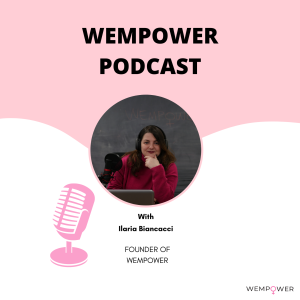
An interview with Jo Healey, journalist and founder of trauma work.
Welcome to a new series of Wempower Podcast.
If you have been following us from the beginning you know that Wempower aims at changing the narrative on women rights and gender issues, by sharing more inspiring, diverse, inclusive and powerful stories of ordinary, but extraordinary women that are changing the world.
With this new series of podcasts, released on the occasion of the International Women's Day, we want to celebrate and acknowledge the stories of women journalists that are an inspiration for us.
Let me share with you that missing narrative and perspective, let’s dive deep into their lives and experiences to discover what motivates them, why they became journalists in the first place, and what are they doing to help and support more journalists to progress, develop, learn and grow.
Trauma-informed journalism is a relatively new term, even though covering trauma — ranging from storms and fires to sexual assaults and homicides to mass shootings and wars — has always been a part of journalists’ work.
Trauma-informed journalism means understanding trauma, understanding what a trauma survivor is experiencing before you show up at their door, and understanding how your actions [as a journalist] will impact them after you pack up and leave.
To investigate this further I have invited Jo Healey senior news journalist and founder of Trauma Reporting. Jo has worked for radio and TV covering hundred of people’s sensitive stories.
She devised Trauma Reporting training for BBC News and Current Affairs and factual programming. She is the author of "Trauma Reporting, A Journalist’s Guide to Covering Sensitive Stories".
She authored UNESCO’s document "Safety of Journalists Covering Trauma and Distress: Do No Harm" which has been translated into seven languages.
She delivers training, lectures and keynotes worldwide.
More Episodes
 2024-10-14
2024-10-14
 7
7
 2024-03-18
2024-03-18
 11
11
 2024-02-26
2024-02-26
 28
28
 2024-02-12
2024-02-12
 13
13
 2023-08-14
2023-08-14
 19
19
 2023-05-05
2023-05-05
 13
13
 2023-02-20
2023-02-20
 9
9
 2022-12-05
2022-12-05
 9
9
Create your
podcast in
minutes
- Full-featured podcast site
- Unlimited storage and bandwidth
- Comprehensive podcast stats
- Distribute to Apple Podcasts, Spotify, and more
- Make money with your podcast
It is Free
- Privacy Policy
- Cookie Policy
- Terms of Use
- Consent Preferences
- Copyright © 2015-2024 Podbean.com






